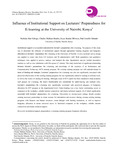| dc.description.abstract | Institutional support is an essential antecedent for lecturer’s preparedness for e-learning. The purpose of this study
was to determine the influence of institutional support through appropriate training programs and budgetary
allocation on lecturers’ preparedness for e-learning at the University of Nairobi. A cross-sectional survey design
was applied to source data from 212 lecturers and 96 administrative staff. Both quantitative and qualitative
techniques were applied to process, analyze, and interpret the data. Quantitative analysis yielded descriptive
statistics as well as cross tabulations with Chi-square (x2) statistic. The study found lack of significant relationship
between lecturer’s preparedness for e-learning and knowledge of the existence of an Information and
Communication Technology (ICT) training program. The existing training program was still underdeveloped in
terms of funding and strategies. Lecturers’ preparedness for e-learning was also not significantly associated with
perceived effectiveness of the existing training program; but was significantly related to training in software tools,
as well as the source of funding for training. Although a team of ICT experts has been mandated to help academic
staff prepare for e-learning, the team’s functionality was constrained by under-funding and multiple roles.
Lecturer’s preparedness for e-learning also significantly associated with perceived adequacy of budgetary
allocation for ICT program at the departmental level. Under-funding was a key factor constraining access to
computers at the workplace, reliable internet connectivity and timely technical support, all of which significantly
associated with lecturers’ preparedness for e-learning. Universities in resource-poor settings should consider
creating necessary partnerships to create avenues for information and resource sharing, revamp existing training
programs with financial and human resources, create linkages with funding institutions, as well as improve
budgetary allocation to ensure universal access to functional computers at the workplace, reliable internet
connectivity and timely technical support.
Keywords: institutional support, preparedness, e-learning, training program, budgetary allocation | |

